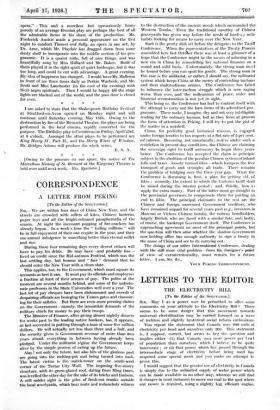CORRESPONDENCE
A LETTER FROM PEKING
[To the Editor of the SPECTATOR.]
SIR,—We are within four days of China New Year, and the streets are crowded with sellers of kites, Chinese lanterns, paper toys and all the bright-coloured paraphernalia of the season. At night the incessant popping of fire-crackers has already begun. In a week's time the " toiling minions " will be in full. enjoyment of their one respite in the year, and their one annual indulgence in something better than eternal millet . and rice.
During these four remaining days every decent citizen will have to pay. Lis debts. He may have—and probably has— lived on credit since the Mid-autumn Festival, which was the last settling day, but honour and " face " demand that he should enter the New Year with a clean slate.
This applies, too, to the Government, which must square its - accounts as best it can. It must pay its officials and employees a fraction at least of their arrears of pay. The police at the moment are several months behind, and some of the unfortu- nate professors in the State Universities well over a year. The last lot of pay cheques have been dishonoured and crowds of despairing officials are besieging the Yamen gates and clamour- ing for their salaries. But there are even more pressing claims on the Government—namely, the irresistible demands of the . military chiefs for money to pay their troops.
The Minister of Finance, after giving almost nightly dinners for weeks past to the leading native bankers, has, it appears, at last succeeded in putting through a loan of some five million dollars. He will actually net less than three and a half, and -the security given is Government revenue of more than two ,years ahead, everything- in between having already been pledged. Under the militarist regime the Government keeps alive by the simple process of eating up the future.
• Alas ! not only the future, but also bits of the glorious past are going into the melting-pot and being turned into cash. The latest victim is the watch-tower on the south-west corner of the Tartar City Wall. The imposing five-storey structure, with its green-glazed roof, dating from Ming times, was levelled the other day for the sake of its bricks and timbers. A still sadder sight is the piles of fresh-cut trunks outside the local woodyards, which bear mute and melancholy witness
to the destruction of the ancient woods which surrounded the Western Tombs. Even the traditional sanctity of Chinese graveyards has given way before the needs of hard-a p mili- tarists looking for means to carry over the New Year.
Such is the pretty dish set before the delegates to the Tariff Conference. When the representatives of the Treaty Powers assembled here last Octo%er there was at least a glimmer of a hope that the Conference might be the means of ushering in a new era in China by remodelling her national finances on a sound and solid basis. Unfortunately, the strong man nr,..ta
be bound before you can spoil his good?. The strong man in this case is the militarist, or rather, I should say, the militarist _system which keeps China at the mercy of contending tuchnns and their multitudinous armies. The Conference has failed .to influence the inter-tuehun struggle which is now raging worse than ever, and the millennium of peace, order. and financial reconstruction is not yet in sight.
This being so, the Conference has had to content itself with the attempt to carry out the bare items of its advertised pro- ,gramme. These make, I imagine, dry and not very intelligible reading for the ordinary layman, but as they form at present the focus of attention in Peking, I will try to put the gist of the matter in a nutshell.
China, for perfectly good historical reasons, is engaged under foreign treaties to tax imports at a flat rate of 5 per cent. ad valorem. Becoming, not unnaturally, restive under such a restriction in present-day conditions, the Chinese arc claiming the sovereign right to tariff autonomy to begin three years hence. The Conference has accepted the claim in principle subject to the abolition of the peculiar Chinese system of inland tolls and taxes—loosely termed likin—which hampers the free transport of goods and strangles all trade. There remains the problem of bridging over the three-year gap. What the
Conference is discussing is, first, a plan for getting rid of likin ; secondly, the extent to which the Customs tariff shall be raised during the interim period ; and, thirdly, how t3 apply the extra money. Part of the latter must gO straight to the provincial goveinors to compensate them for putting an . end to likin. The principal claimants to the, rest arc the .Chinese and foreign unsecured Government creditors, who have remained unpaid for several years past (e.g., investors in ,Marconi or Vickers Chinese bonds), the railway bondholders, largely British, who arc faced with a similar fate, and, lastly, of eourse, the bankrupt Government itself. The Conference is approaching agreement on most of the principal points, but the question will then arise whether the shadow-Government now holding office has enough authority to sign a treaty in
the name of China and see to its carrying out. - The doings of our other International Conference, dealing with the still more vital problem--from the foreigner's point of view---of extraterritoriality, must remain for a future letter.--I am, Sir, &c.,
YOUR PERI:NIG CORRESPONDENT.


























































 Previous page
Previous page